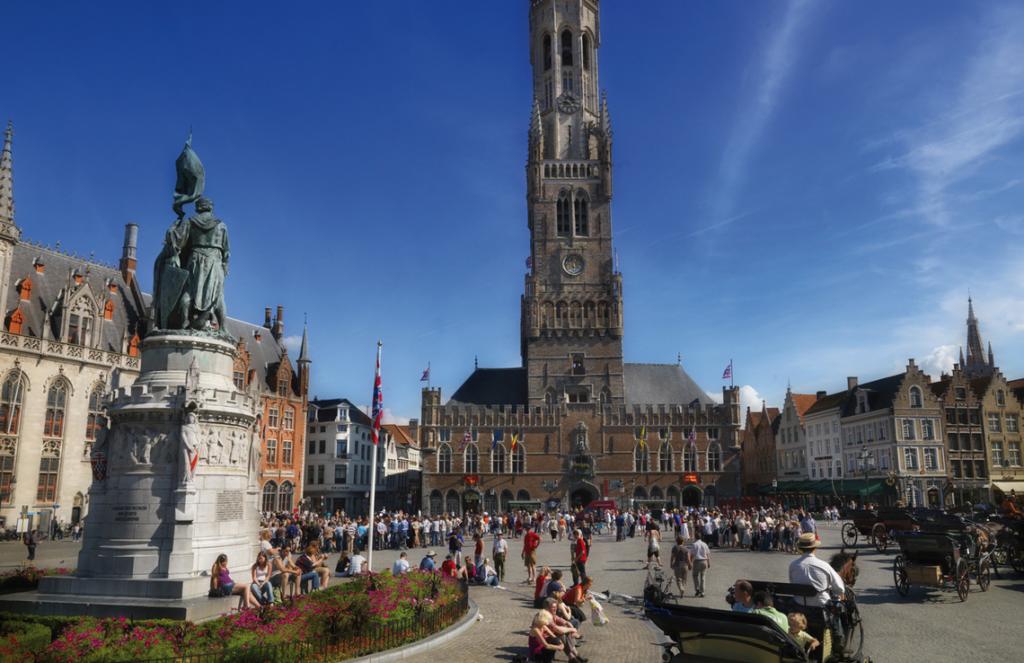Thessaloniki gets ready for its metro launch in November
The underground rapid transit lines have been under construction for almost two decades due to various project delays
 TheMayor.EU logo
TheMayor.EU logo 
Bruges is one of the most well preserved medieval cities in Europe, Source: Visit Bruges/Jan D'Hondt
The city’s new climate strategy will work in tandem with the recently approved Spatial Policy Plan to provide a holistic vision for a sustainable future
Today, authorities in Bruges, Belgium, presented the city’s new climate strategy for the next 30 years. It sets out very ambitious goals for 2030, proposing that the city halve its emissions. The strategy also calls for newly constructed buildings to be climate neutral and an expansion of cycling infrastructure. At the same time, authorities have said they are working on a proposition for a sustainable transition in the existing building stock.
The climate strategy comes at the tail end of the recently approved Spatial Policy Plan, a collection of urban development guidelines, focusing on maximising the city usage of space. The Spatial Policy Plan outlines the city’s priorities both in terms of building use, household suitability and integrating construction with climate goals.
Alderman for Spatial Planning Franky Demon explained that the new plan does not mean more construction. Instead, it means smarter and better construction. He also emphasised that all future development needs to happen in accord with the climate functions of the urban space.
This means that new projects need to accommodate Bruges’ green spaces, both big and small, as well as its blue spaces. He pointed out that important new factors in city planning are flood protection as well as drought protection.
In practical terms, this means that the natural features of a city need to have adequate small inner water basins and dykes, which can help retain water during heavy rain and flooding and disperse it during drought.
According to a report by the VRT, a Flemish news platform, Bruges’ Alderman for Climate and Energy Minou Esquenet has said that the plan goes very far into providing robust strategies for municipal climate action.
It touches on topics like renewable energy expansion and climate-neutral heating systems, with an emphasis on housing improvements for residents. At the same time, Alderman Esquenet has said that the city will provide subsidies to individual homeowners for the improvements.
Emissions targets, however, are quite moderate. The plan calls for a 50% reduction in CO2 emissions by 2030 and climate neutrality by 250. Alderman Esquenet explained that according to current data 50% of the city’s emissions come from business and public buildings and they need to reduce that number.
Moreover, she dismissed the idea of introducing low emissions zones in the city, as a measure that is too divisive. However, she also said that the administration wants Bruges to become a car-free, bicycle-friendly city and it will take action towards that goal.

The underground rapid transit lines have been under construction for almost two decades due to various project delays

Now you can get your wine in Talence by paying directly in Bitcoin

That’s because the state has to spend money on updating the railway infrastructure rather than subsidizing the cost of the popular pass

Rethinking renewable energy sources for the urban landscape

The examples, compiled by Beyond Fossil Fuels, can inform and inspire communities and entrepreneurs that still feel trepidation at the prospect of energy transition

Now you can get your wine in Talence by paying directly in Bitcoin

The 10th European Conference on Sustainable Cities and Towns (ESCT) sets the stage for stronger cooperation between the EU, national and local level to fast track Europe's transition to climate neutrality.

At least, that’s the promise made by the mayor of Paris, Anne Hidalgo

The underground rapid transit lines have been under construction for almost two decades due to various project delays

At least, that’s the promise made by the mayor of Paris, Anne Hidalgo

Hostal de Pinós is located in the geographical centre of the autonomous region

Despite its church-y name, the district has long been known as the hangout spot for the artsy crowds

Urban dwellers across the EU are having a say in making their surroundings friendlier to people and the environment.

Forests in the EU can help green the European construction industry and bolster a continent-wide push for architectural improvements.

Apply by 10 November and do your part for the transformation of European public spaces

An interview with the Mayor of a Polish city that seeks to reinvent itself

An interview with the newly elected ICLEI President and Mayor of Malmö

A conversation with the Mayor of Lisbon about the spirit and dimensions of innovation present in the Portuguese capital














